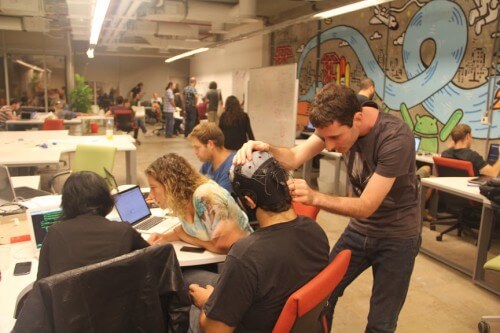The hackathon is an opening shot for the international brain conference BrainTech Israel 2013 which will open today (Monday) at Hagar 11 in Tel Aviv

Tonight (Saturday) the first brain hackathon of its kind in Israel, BrainiHack, initiated by the Israel Technologies Association (IBT), came to an end as part of the events of the Israel BrainTech 2013 conference that will be held on October 14-15 at Hangar 11 in Tel Aviv. The hackathon, which took place at the Google campus in Tel Aviv, brought together hundreds of developers, programmers, brain researchers, designers and artists, who worked continuously for 36 hours, with the aim of developing and creating applications based on brain-machine interfaces.
The jury included four leading industry and academics: Dr. Yossi Matias - CEO of the Google Israel R&D Center; Ariel Garten - founder and CEO of InteraXon; Prof. Doron Friedman - Virtuality Lab, Herzliya Interdisciplinary Center and Dr. Rafi Gedron - founder and chairman of the Israel Brain Technologies Association (IBT), who crowned the three winning projects out of the 20 participating projects.
The first place went to Miyagi Learning Enhancer, which is an EEG-based software for improving personal learning. The leaders of the team, the pair of students Michael Doron (26) from the Hebrew University in Jerusalem and Roi Zetot (26) from Bar Ilan University, gathered about 15 other team members around them for the adventure.
According to Michael Doron: "We developed a learning platform that works on a brain-machine interface helmet, which alerts the user when he loses attention and offers him breaks or refresher content. Our application works on several types of helmets and currently the development is completely completed and works perfectly on one of them."
According to Lior Redlos (28), another team member: "We thought about the idea about two weeks ago, but the actual development and writing of the code started and ended here at the hackathon. Our platform will be able to be used by students in classrooms, educational institutions and ADHD treatment centers, as well as people in various professions for whom concentration is essential, such as scanners at airports or security guards who watch security footage for long hours."
The second place went to the Mind Your Poem project - an application that generates poetry based on reading thoughts and the third place went to a perceptual project that allows the identification of the opponent's intention in sleight of hand.
The first place winners won an Enobio brain-machine interface helmet worth 4000 euros in addition to the Muze helmet, worth 400 euros, which all the winning projects in the first three places won.
According to Hamotal Meridor, the initiator of the hackathon and a member of the board of directors of the Israel Brain Technologies Association (IBT): "I was moved to see the hundreds of people who worked and exerted themselves during the event and allowed innovation and creativity to develop into actual projects. I hope that this event will be an indication of the technical maturity and feasibility that exists in Israel in terms of the supply of brains. Hence, it is our responsibility to lead the braintech field and we must nurture it."

2 תגובות
safkan, we use off the shelf products that are similar in shape and size to rainbow earrings. This is not a bulky helmet.
Study with a helmet on your head? It's a headache and physical harassment that doesn't allow concentration. Fatigue and lack of concentration I do it myself without help, I suppose this is the case with anyone whose occupation is prolonged thinking; Solutions for fatigue and lack of concentration are also well known, they differ from person to person.
in brief. We gave a first prize for inventing an unnecessary and burdensome gadget.